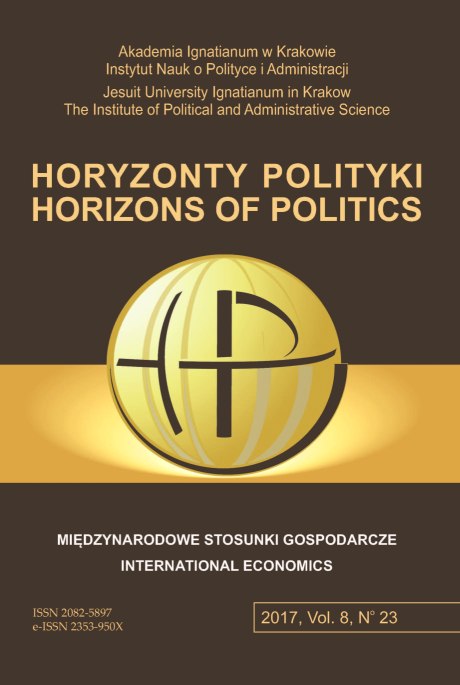Stanowisko Niemiec w procesie dalszego przewodzenia
w Unii Europejskiej
Development prospects for Germany and its significance for further deepening and enlargement of European integration
Author(s): Tadeusz SporekSubject(s): Supranational / Global Economy, EU-Approach / EU-Accession / EU-Development, Financial Markets
Published by: Uniwersytet Ignatianum w Krakowie
Keywords: Germany; exports; imports; banking union; Eurozone;
Summary/Abstract: RESEARCH OBJECTIVE: This article aims at analyzing German foreign trade and its connection with crucial economic indicators of Germany, as well as discussing the importance of activities undertaken by Germany in order to reform the European Union. Germany – the most important net contributor of the EU – is undoubtedly the so called “development engine” of the whole integration block. The current state and development perspectives of this country will influence the future of the EU, in that the future of euro area. Additional target of the paper is to analyze the scale and scope of German leadership in the EU in the post‑crisis period and after the decision of the United Kingdom to leave the EU. THE RESEARCH PROBLEM AND METHODS: The basic problem of this publication is the quantitative and qualitative analysis of publications regarding German economy, the economy in which exports together with consumption expenditure constitute the crucial stimuli for economic growth. Statistical data analysis was used in the paper. International statistical reports were used as sources of statistical information. The latest data were taken from Internet sources. THE PROCESS OF ARGUMENTATION: The line of reasoning consists of two essential elements. At first critical analysis of literature is given. The next part focuses on the empirical analysis of German economy, including main macroeconomic indicators and German leadership in the European Union. RESEARCH RESULTS: There are two different opinions on the German economy and on the role of Germany in the process of banking union creation and euro area functioning. The number of publications in the field is pretty large, but the literature has to be enlarged, supplemented and even corrected in terms of its quality. CONCLUSIONS, INNOVATIONS AND RECOMMENDATIONS: The problem of the position and role of Germany in the EU should be promoted among academics, politicians and businessmen. The problem desires deep discussion. It is of great significance for regional economic integration and European Union specialists, as well as those interested in Polish‑German relations.
Journal: Horyzonty Polityki
- Issue Year: 8/2017
- Issue No: 23
- Page Range: 183-204
- Page Count: 22
- Language: Polish

